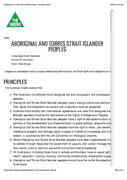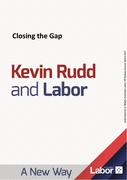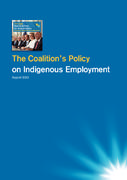During the 2007 election campaign it was Labor’s Kevin Rudd who sought to make indigenous policy a leadership issue. After gaining power, Mr Rudd made history by fulfilling his promise to deliver a national apology to the Stolen Generations.
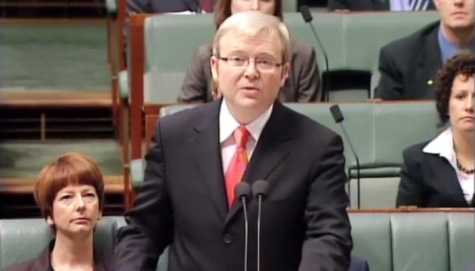
This symbolic recognition was accompanied with a long-term strategy called ‘Closing The Gap’ that aimed to stop the disparity between indigenous and non-indigenous Australians on social indicators such as poverty, health and education.
In this election campaign it is the Coalition’s leader, Tony Abbott, who has pledged to make the portfolio a personal priority if he wins office. If elected, he will become Australia’s first prime minister for indigenous affairs. He will carry on his yearly habit of spending a week in a remote indigenous community. And he will continue Labor’s commitment on constitutional recognition for Aboriginal people, putting it on his first-term agenda.
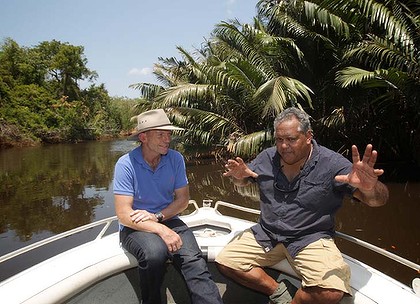
While not an exhaustive list of commitments, here is what the three parties are offering up as indigenous policy in 2013:
The Coalition
The Coalition’s main focus is on governance and economic development. Abbott has enlisted some powerful Aboriginal leaders to help him steer policy renewal. Former ALP president Warren Mundine has agreed to head a new indigenous advisory board that would meet with the prime minister three times a year. Mr Mundine is keen to drive economic development by abolishing numerous statutory indigenous governance bodies, opening up communities and changing land ownership systems to facilitate private homes and businesses.
Mr Abbott will also support a blueprint by indigenous leader Noel Pearson called ‘Empowering Communities’ that will evaluate the money spent on Aboriginal services. The Coalition will commit $5 million to help establish a new statutory body called the Indigenous Policy Productivity Council that will monitor programs and identify why they are failing. Labor has also given a commitment to develop these welfare reforms, which are based on the principle of indigenous-led responsibility.
But the Coalition is directing most of its indigenous policy funding towards creating employment. It has promised $45 million to support training and workers through the ‘Generation One’ model with the aim of giving 5,000 indigenous Australians a job. The party will also commission a review on training and jobs to be headed by mining magnate Andrew Forrest that will report to the prime minister within six months of the election.
The ALP
In contrast to Mr Rudd’s involvement in 2007, Labor’s Indigenous Affairs Minister Jenny Macklin has been the face of her party’s policy, which focuses on social services through its ‘Closing the Gap’ strategy. In this election, Labor’s main commitments have been to new targets of participation in higher education, access to disability services and tackling the high rates of indigenous incarceration. Labor will also invest more in health and housing to improve outcomes.
Like the Coalition, Labor will provide $5 million to support community-led approaches to welfare reform, such as those trialled by Mr Pearson in Cape York. Labor say they are committed to continuing to work with indigenous leaders who have been driving change in their communities on future reform. Labor will also work on a tax-exempt Indigenous Community Development Corporation for native title payments to be better harnessed.
Labor remains committed to the ‘Stronger Futures’ strategy, which followed the Coalition’s controversial Northern Territory ‘Intervention’, and focuses on alcohol management, education, and welfare reform. In line with this, Labor will spend $15 million for communities across the country to develop alcohol management plans and community-driven solutions to protect women and children.
The Greens
The Greens have formed their indigenous policy on a rights-based agenda underpinned by principles including recognition, self-determination and international law. The greatest points of difference from the two major parties is the Greens’ aim to enshrine a treaty that recognises prior occupation and sovereignty in the Constitution; to compensate the Stolen Generations; and to rescind the ‘Stronger Futures’ legislation.
The Greens will support the Human Rights Commission and the First People's Congress to create a national action plan for implementing the UN Declaration on the Rights of Indigenous People into Australian law and policy making. They will provide $15 million in grants over three years, from July 2014 for community engagement. The party has also made funding commitments for indigenous rangers and indigenous legal services.
To sum up
What comes as no surprise is that all three parties have adopted policies that are consistent with their ideology. Perhaps the most intriguing development in this policy area is the potential for a conservative prime minister to take charge of what has been the seemingly intractable challenge of easing disadvantage in Aboriginal communities. Although indigenous policy has been a relatively low-key issue in this election campaign, we may see it gain much more prominence if the Coalition gains power.

